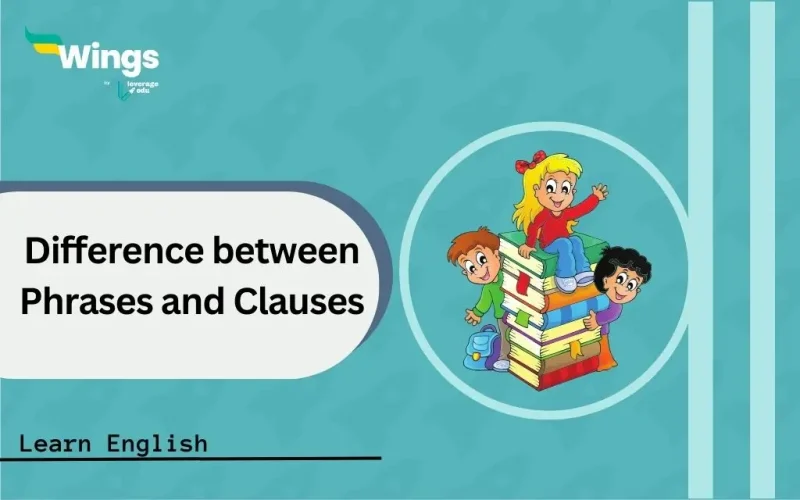Phrases vs. Clauses: Groups of words that work together to accomplish a single task within a sentence are referred to as phrases and clauses. Individually, a phrase is a collection of words with either one or both of the partial subjects or verbs, or neither. Whereas, a clause is a mixture of words that build a sentence. It comprises a subject and a predicate.
In this blog, we will provide detailed knowledge about the difference between phrases and clauses with the help of a few examples to improve your English grammar.
This Blog Includes:
Learn All about Phrases Here!
Phrases vs. Clauses
Sentences are constructed using both phrases and clauses. A phrase is a collection of words that function as a whole without a subject and a predicate. On the other hand, a set of words functioning as a unit with a subject and a predicate is called a clause. It may be able to stand alone as a complete sentence, while a phrase can never do so. To have more clarity about both, go through the pointers below:
| Phrases | Clauses |
| A collection of words which do not have a subject and a verb, also they can stand individually. | A group of words, which have a subject and a verb in a certain grammatical structure. |
| A phrase is a component of a clause | The clause is a part of the complete sentence. |
| A portion of a sentence that lacks the subject and a predicate— that is a phrase, doesn’t express any meaning. | A portion of a sentence that has two parts of speech. i.e. subject and predicate. |
| Examples: The black cat, Jumped over the fence, Extremely delicious, etc. | Examples: He walked to the park, Because it was snowing, He walked to the park because it was raining, etc. |
Read also: What are Clauses
Difference between Phrases and Clauses through Examples
To have a complete idea about phrases and clauses, below are some examples that students can refer to:
| Phrases Examples | Clauses Examples |
| Over the window | She walked to the store. |
| Around the corner | Although it was raining. |
| Jumping high | The dog barked loudly. |
| Walked slowly | While we were eating dinner. |
| Above the cloud | She finished his homework early. |
| Extremely delicious | Because She was tired. |
| The big house | They went to the beach. |
| Without any hesitation | After they had finished their project. |
| Near the beach | The dog chased the mouse. |
| Under the tree | When the sun sets. |
Also read: 15 Best Phrases Examples
Phrases and Clauses Exercises
Instruction: In the below sentences, Identify whether the highlighted part is a Phrase or Clause.
1. Faced with numerous challenges, she decided to get assistance from a Psychologist.
2. She came to work on time despite missing the bus.
3. Before consuming any supplement, he always talks to my nutritionist.
4. Amisha lived outside her home for 6 years.
5. In the dawn, it’s perfect to get up early.
6. She was offended by the little kid yelling loudly.
7. He likes the educator who is wearing spectacles.
Answers
- Phrase
- Clause
- Clause
- Phrase
- Clause
- Phrase
- Clause
FAQs
A phrase is a collection of words that function as a whole without a subject and a predicate. Whereas, a set of words functioning as a unit with a subject and a predicate is called a clause.
A phrase is a group of words that behaves as a part of speech like “my sister Jane” an adjective “in a different shade of red”, and the adverbial phrase “with elegance and tact”. A clause is a noun phrase or a verb; whereas they don’t always have to be, such as “He loves eating bread”, and “My pet barked a lot”.
Both a phrase and a clause are two or more words that deliver the same ideas. It is easy to identify if you are using a phrase or a clause. The main difference is that clauses have both a subject and a predicate, unlike phrases.
Related read:
| Parts of Speech | Article Rules: A Complete Guide |
| List of Conjunctions | How to Write a Letter: Letter Writing Types and Examples |
| 101+ One Word Substitutions | List of Idioms and Phrases for IELTS |
This was all about the difference between phrases and clauses with examples in Learn English. Hope you understand the concept and know how to proceed. You can also follow the Learn English page of Leverage Edu for more exciting and informative blogs.


 One app for all your study abroad needs
One app for all your study abroad needs












 60,000+ students trusted us with their dreams. Take the first step today!
60,000+ students trusted us with their dreams. Take the first step today!